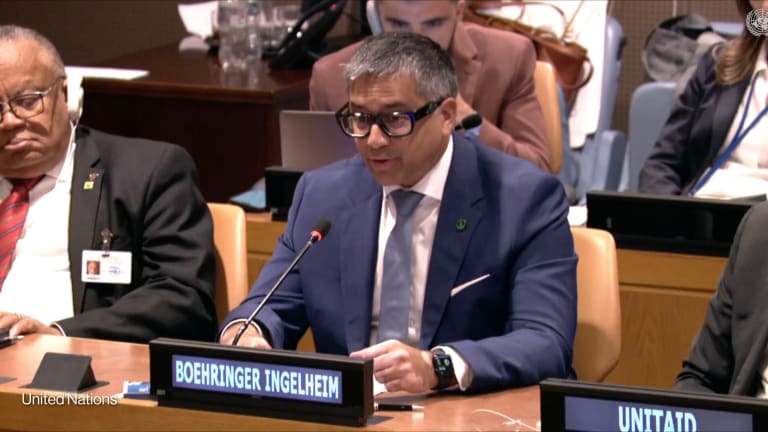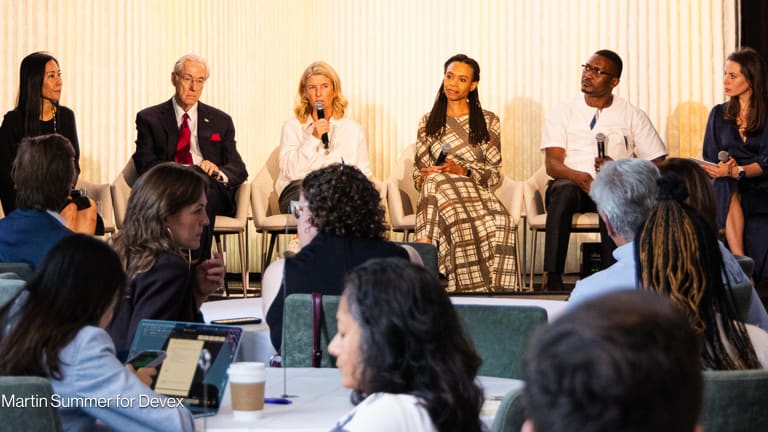
GLASGOW, Scotland — The coronavirus is expected to have a huge impact on mental health globally, but displaced populations including refugees, migrants, and internally displaced people will be disproportionately affected.
The prevalence of mental health conditions is already higher among displaced populations and measures in place to curb the spread of the novel coronavirus are likely to exacerbate these. As a result, it is critical that mental health support is part of the ongoing response and that it reaches these populations, experts told Devex.
Refugees can experience a whole range of mental health problems from relatively mild conditions, such as distress and anxiety, to those of a more severe nature, such as depression, psychosis, or bipolar disorder, explained Pieter Ventevogel, senior mental health officer at the UN Refugee Agency. But it’s thought that about 1 in 5 suffer from mental health conditions of clinical concern, Ventevogel explained.
“We do anticipate an increase, if not double, of mental health [and] psychosocial situations in these settings.”
— Mesfin Teklu Tessema, head of health unit, International Rescue Committee“Those figures are enormous if you talk about a large refugee population in a specific country,” he said.
Among some displaced populations, these numbers are even higher. Jan Kizilhan, a psychologist who works with the displaced Yazidi community and genocide survivors in northern Iraq, said that almost 50% of this community experiences post-traumatic stress disorder as well as anxiety and depression.
On top of the existing challenges, the COVID-19 pandemic means people in the camps are anxious about what will happen when the disease reaches them — they know there is not enough health care or medical staff, he explained. Since lockdown measures were introduced, two suicides have already been reported in the camps — although, according to Kizilhan, suicides were not unheard of prior to the measures.
For all the latest news, jobs, funding opportunities — including remote work and social distancing resources.
Mesfin Teklu Tessema, head of the health unit at the International Rescue Committee, said that while mental health conditions are common among populations affected by conflict and displacement, mild conditions can normally be managed through community level care.
Yet the current restrictions are making it difficult for these interventions to be delivered, and the organization is looking at how to address the potential effects, which could have “huge implications in terms of mental health and psychosocial well-being,” he said.
“I think we do anticipate an increase, if not double, of mental health [and] psychosocial situations in these settings,” Tessema said.
Fears around COVID-19 also mean that refugee groups in some places are being stigmatized and facing restricted access to services. Past experience from the Ebola crisis and other outbreaks shows that the exclusion of groups puts them at risk of increased mental distress, Tessema explained. It also makes it less likely that they will access health care for fear of reprisal.
With these concerns in mind, how can organizations navigate the various restrictions and continue delivering mental health services?
Education and tackling misinformation
One of the biggest issues is the lack of reliable information available for people in camps, said Kizilhan.
Educating these populations on the disease, the psychological impact of the situation, and recommendations for dealing with mental health disorders is critical, he explained. But “we have to inform the people in different ways that they can understand, not [in a way that’s] highly academic and scientific,” he said. Kizilhan has been involved in the creation of short video clips in the Kurdish language that aim to address some of these concerns.
How do you say 'social distancing' in Swahili?
Around the world, translators are tasked with communicating emergency health advice that may have little meaning or relevance in a local context.
Language can be a huge barrier, Tessema added, and refugees will be hearing all sorts of misinformation so “tailoring the message to the language they understand is key.” Dispelling rumors and misinformation also helps ensure the safety of staff entering the camps, he explained. IRC is currently exploring options for staff to live inside the camps to help build trust between them and the communities they are working with.
Adapting interventions
Organizations are prioritizing support for high-risk cases and trying to ensure medication is reaching those with more severe symptoms, while reducing the individual’s need for frequent travel.
Counseling interventions are for the most part continuing, but taking on different modes of delivery, the experts said.
Based on local risk assessments, services are being adapted but there is no “one-size-fits-all” solution, according to Tessema. In Tanzania, IRC is moving away from group-based interventions and providing individual counseling which still observes social distancing. In other regions, it is delivering services through SMS and Whatsapp.
Meanwhile in Iraq, Kizilhan is working with local psychology students to launch a website that will offer online counseling to camp residents and provide responses within 24 hours.
“But we also understand that not everyone has access to technology, especially for women,” Tessema said. The network of community workers already living in these communities are therefore hugely important at this time, he added.
For the UN Refugee Agency, which helps to provide psychotherapy sessions through its partners, all group activities have now stopped and the agency is looking to shift therapy sessions online. Staff are being trained in how to deliver sessions via Skype or phone, Ventevogel said.
“It’s probably going to work in settings where you have relatively good infrastructure, people have telephones, … reliable network,” he said, but “it will be difficult in areas where that is not available and people are confined to their home which is a one room apartment.” Surrounded by family, it can be more difficult for individuals to discuss personal issues.
Kizilhan believes that international agencies could be doing more to mobilize the educated young people who live in camps or local communities and could provide support during this time.
The United Nations and World Health Organization also need to send a clear message to people in camps that they are not forgotten, Kizilhan said. He suggested that providing education for them via online platforms would be a good place to start.
Integrating mental health into other services
The UN Refugee Agency also works with partners to integrate mental health into primary health care and train medical staff on these issues — something they are building on during this crisis.
“[We are also] training staff who are in contact with refugees … it could be someone who is doing food distribution or issues related to shelter,” Ventevogel said. “Those are people who may be approached by refugees in distress and we need to train them in how to respond in a good way.”
Staff workshops on psychological first aid, which are also being adapted for online learning, are really important, stressed Ventevogel. It’s difficult for staff who may still be having face-to-face contact with a distressed individual but can’t respond as they normally would, which might involve sitting down to talk and perhaps even putting an arm around them, he explained.
As the crisis continues, mental health support will likely involve some “task sharing,” Ventevogel suggested. This might involve people who have limited formal skills in psychology but can be trained, supported, and supervised by other professionals from afar.
Tessema urged that mental health should not be an afterthought in this response. It’s often one of the first areas to see funding cuts, he said, but now more than ever organizations need money which is flexible enough for them to tailor the response to local contexts and meet community needs.
Visit our dedicated COVID-19 page for news, job opportunities, and funding insights.

Search for articles
Most Read
- 1
- 2
- 3
- 4
- 5








